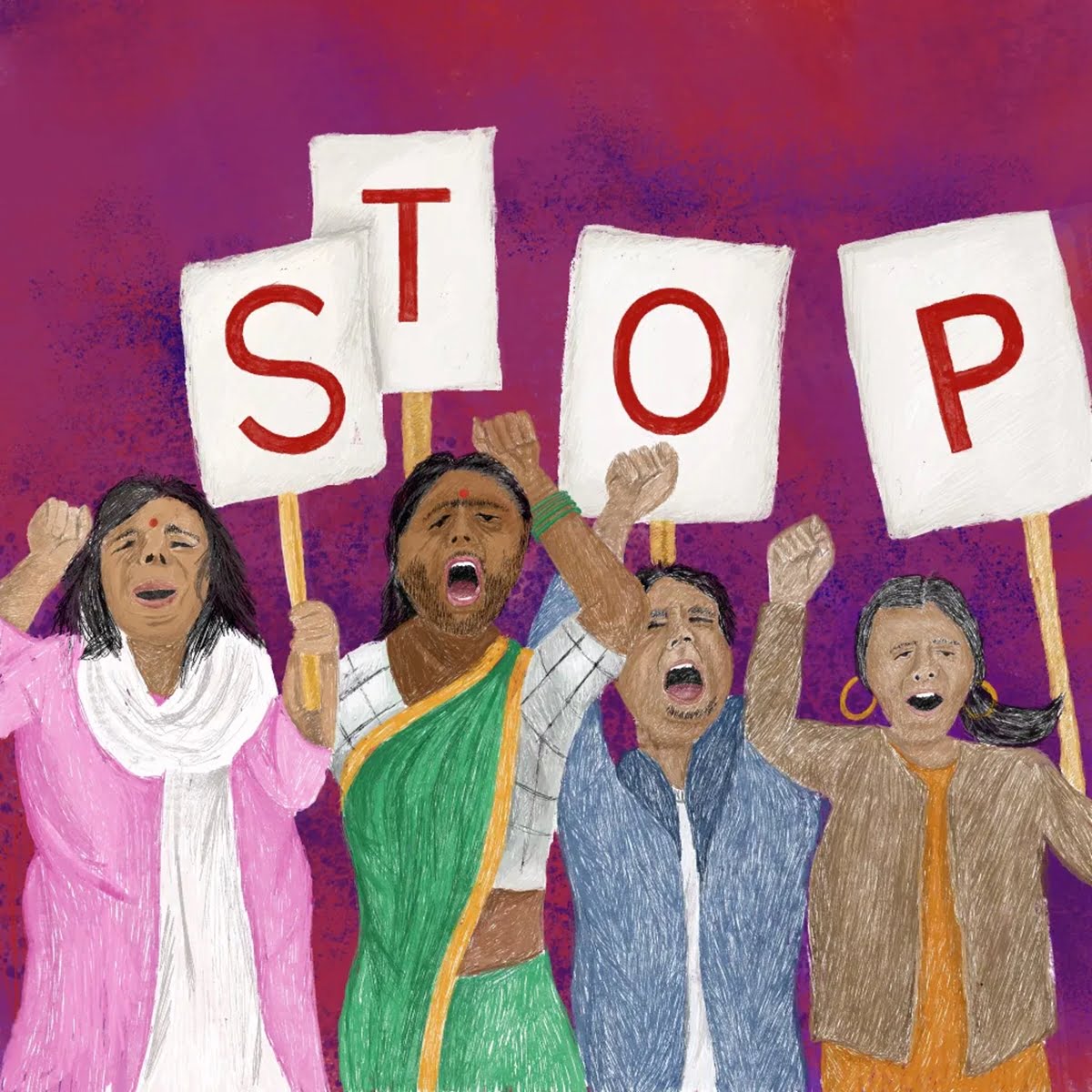TW: Mentions of rape
An example of the deep-seated rape culture ideology prevalent around us is the recent incident of comedian Agrima Joshua being publicly threatened with rape and violent sexual abuse by a YouTube influencer Shubham Mishra for her deemed offensive jokes on military leader and revered figure, Chhatrapati Shivaji, is Though Mishra was detained in a suo moto action by the Vadodara Police, partly due to the social media rage that erupted over the rape threats, the fact of the matter remains that Mishra is one, rather public, example of the bigger problem of rape culture in the Indian cultural ideology.
Though Shubham Mishra was detained in a suo moto action by the Vadodara Police, partly due to the social media rage that erupted over the rape threats to Agrima Joshua, the fact of the matter remains that Mishra is one, rather public, example of the bigger problem of rape culture in the Indian cultural ideology.
Why is it okay for men to threaten sexual violence when they want to express intellectual disagreement or argue with women? Our cultural and social conditioning has made sure that the idea of honour and respect is directly associated with the women’s genitalia. From Freud’s controversial and convoluted psychological theories of penis-envy to the typically Indian expression of ‘laaj aur sharam aurat ka gehna hote hain’ (modesty and shame are women’s prized jewels), we are consistently exposed to the notion that our dignity and power (or the lack, thereof) reside in our vaginas.
Also read: Infographic: What Is Rape Culture?
Personally, the news of the Joshua-Mishra controversy did not seem entirely shocking to me, because as an Indian woman stepping into my 20s, I have unfortunately already become desensitised to the lewd shenanigans of strange men that perpetuate a rape culture, especially on social media. I was 15 when a stranger masturbated at me from inside his car at a public place in Ajmer one afternoon, and I could never confide in my parents about it. This has been common for most of my Indian female friends – to tell our parents and families about stalkers, abusers, and other such people is difficult because the immediate reaction we fear getting from them would be to curb our freedom and agency. Instead of being seen as violation of our individual consent, incidents like these are immediately associated with a sense of honour and familial dignity of which traditionally women are the repositories.
Indian commercial cinema continues to perpetuate the same power structures and ideologies, wherein the preservation of traditional notions of honour in women’s sexuality trumps their individual identity-making and experience of trauma, thus normalising the rape culture. This is not a recent manufacture, but has been entrenched in our myth-making processes from the times of Ramayana and Mahabharata, in which wars and violence were the only acceptable ‘defence’ for the humiliation of a woman’s supposed sexual honour. Bollywood blockbusters like Garv, Simmba, among numerous others, too capitalise on this ardent belief that sexual abuse is equivalent to the utter evisceration of a woman’s lifelong identity, by showcasing men as saviours and women’s sexualities as their hitherto prized possessions and responsibilities to guard and avenge. Film critic, Suparna Sharma, pointed out in a 2019 interview how rape is used as a plot device in Bollywood, asking the pertinent question, “Why are so many films about a woman’s rape, trauma, even death, actually just about the male hero achieving personal glory?”
Perhaps what Saloni Chopra, Indian actress and social media influencer, shared on Instagram enlightens us with respect to the ingrained associations of rape culture with the traditional honour and hyper-masculine notions of pride – “When you threaten a man, you tell him you’ll break his face. When you threaten a woman, you tell her you’ll tear up her vagina.” The language that we use when indicating any form of harm, as explained by feminist philosopher Ann Garry in her essay “Sex, Lies and Pornography” (and furthered by others), has always been connected with some form of sexual violence, wherein a woman is sexually objectified. Abuses are rarely about threatening direct physical harm or insinuating a lesser intelligence, but almost always correlate with a woman’s body or sexual agency being defiled.
Shreya Vaid, a 22-year old queer woman and a student of Sociology, recounts an experience from when she was 15 – “My math tutor’s son would make me really uncomfortable by following me to my neighbourhood and he touched me inappropriately quite a few times… But I think I was most afraid of telling it to my mom and dad, which shouldn’t be the case, you know? And when I did tell my parents about it years after I had quit the classes, they were more worried about how the tutor’s family would perceive our family. My abuser’s family thinking of me as a dishonourable girl or something was more important to my parents than my lived trauma.”
Another 20-year-old girl, on the condition of anonymity, shared the following opinion – “Every time a male relative or guest would arrive at our home, my dadi (grandmother) and father would want me to change into something they called ‘less revealing’. I was barely an adult then! Why were we having people over who would be sexualising a child? Then I grew up a little to realise it wasn’t my well-being that was a priority maybe, but their own idea of what a cultured girl from a respectable house should wear.”
Both these accounts and my own personal experiences in this regard have one running thread of similarity – threatening sexual violence to demean women is commonplace because the onus of being sexually objectified has been largely put on women as a symptom, and a simultaneous catalyst, of rape culture. Their own value as individuals is diminished within this culture and what gains priority in the familial and social sphere is the commodified version and subsequent itemisation of their place in the world.
Threatening sexual violence to demean women is commonplace because the onus of being sexually objectified has been largely put on women as a symptom, and a simultaneous catalyst, of rape culture.
Also read: Death Penalty Debate And The Death Of Conversation On Rape Culture

It is worth noting that social media activism proved fruitful in engaging with the threats and supporting Agrima Joshua, leading to the rapid action against Mishra. However, while patting ourselves on the back for actively speaking up, it is integral that we acknowledge and assess the larger system responsible for creating the mentality of people like Mishra. It is important to ensure that we introspect and reflect on our own intrinsic beliefs when it comes to the association of a woman’s ‘dishonour’ with sexual objectification and violence. While conversations around rape culture, with the Shubham Mishra case and earlier, with the Bois Locker Room case, have gained popular attention in the recent past, when it comes to our own private circles and friends, we are all somehow culpable of reducing women’s identities and dignity to their sexuality. Usage of words like ‘whore’, ‘motherfucker’, among countless such profanities, in our everyday life is a reflection of the same rape culture. As long as our private, familial, and socio-cultural circles keep associating an abstract notion of traditional honour with women’s sexualities, the living, breathing, physical manifestation of the women around us will continue to be sexually objectified and victimised in order for men like Mishra to assert their sense of power.
As a student of English literature at Lady Shri Ram College, Anushree hopes to learn and un-learn through her writing. She loves dogs and momos and the winter sun, and often makes up poems about them, but she also wants her writing to express the violence and prejudices of the socio-political reality inhabits. The former Print Editor of DU Beat, she has pursued student journalism avenues along with creative writing, with bylines appearing in Terribly Tiny Tales, Live Wire, and Film Companion. She can be found on Facebook, Twitter, Instagram, LinkedIn
Featured Image Source: Aasawari Kulkarni/Feminism In India




